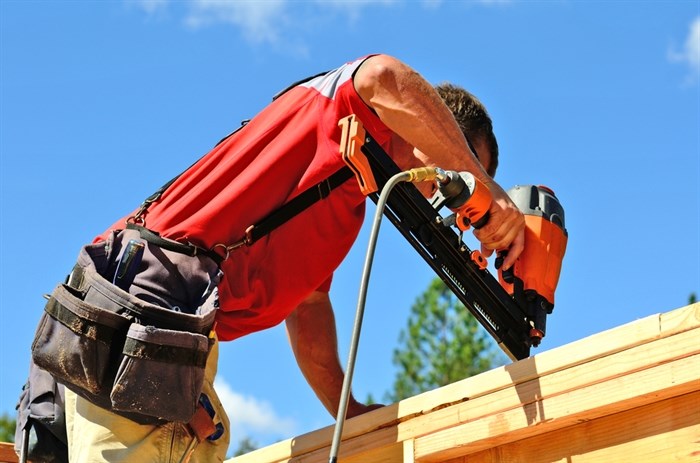
Image Credit: Shutterstock
July 27, 2022 - 6:00 PM
There are lots of tips out there on how to beat the heat as temperatures reach the 40 Celsius range in the Thompson-Okanagan over the next couple of days.
Drink lots of water. Take breaks to cool down. Keep in the shade. Do harder physical work earlier in the day.
Those are just a few of the many suggestions organizations like WorkSafeBC and health agencies put out when Environment Canada issues heat warnings, as it did this week for much of B.C.
But, for people who have to work in excessive heat, there’s another option.
“Workers in B.C. have the right to refuse unsafe work,” WorkSafeBC said in an email to iNFOnews.ca. “Section 3.12 of the Occupational Health and Safety Regulation spells out the right of a worker to refuse work if there is reasonable cause to believe it would create an undue hazard to their health and safety.”
Can heat constitute an undue hazard?
Definitely.
“Symptoms of heat exhaustion include excess sweating, dizziness, fainting and muscle cramps,” WorkSafeBC said in a news release earlier this week. “Symptoms of heat stroke include cessation of sweating, an increased breathing rate, confusion, seizures and even cardiac arrest.”
Workers who feel their health is at risk should, first of all, raise their concerns with their employer.
“If the issue persists, workers are encouraged to contact WorkSafeBC,” the email said. “A WorkSafeBC prevention officer will then investigate and take steps to find a workable solution.”
The number to call is 1-888-621-7233 to speak directly with a prevention officer. It can be done anonymously.
“It is illegal for an employer to penalize a worker for raising a health or safety issue at work,” the email from WorkSafeBC says. “Workers cannot be disciplined for refusing unsafe work. If a worker experiences negative actions from their employer, a prohibited action complaint can be submitted.”
They can also call WorkSafeBC’s Prevention Information Line at 604-276-3100.
So, is all this necessary?
During last year’s record-breaking heat dome, WorkSafeBC accepted 115 claims for heat stress. It averaged 41 claims per year over the previous three years.
READ MORE: 57 heat dome fatalities in Thompson-Okanagan
It does not break down data by region but one third of the claims were by people working indoors.
“In particular, we saw issues in hospitality, accommodations, food/leisure services and manufacturing,” the email said.
While the current heat wave is not bringing record-breaking temperatures in the high 40s, as happened last year, they are approaching the 40 C mark this week.
READ MORE: One more day of the heat wave pushes Okanagan and Canadian records even higher
And it’s not just a matter of employers sitting back waiting for the heat to hit then doing something about it.
“Employers must conduct a heat stress assessment where a worker is, or may be, exposed to environmental conditions that could cause heat disorders,” the WorkSafeBC email said. “Leading up to the summer months where heatwaves are predictable, and in advance of a heatwave (like the one we are currently in), would be the appropriate time to conduct an assessment and look at mitigation strategies.”
That should be done in consultation with workers. They, along with supervisors, should be trained about things like how heat affects the body, how to recognize symptoms and what to do if a worker develops a heat disorder.
Employers can do things like make sure no one works alone, have adequate first-aid available, modify working conditions and practices to minimize the risk of heat stress, set up work-rest cycles, rotate work in the heat between different employees and set up cooling areas with shade and water.
For workers, they should drink one glass of water every 20 minutes, the WorkSafeBC news release says. They should wear light-coloured, loose-fitting clothing made with a breathable fabric like cotton and take their rest breaks in cool, well-ventilated areas.
The hottest day of this heat wave is forecast for Thursday with temperatures hitting 38-39 C.
But the heat is expected to drop only a degree or two through the weekend before dipping into the lower 30 C range early next week.
More information on preventing heat stress can be found here.
To contact a reporter for this story, email Rob Munro or call 250-808-0143 or email the editor. You can also submit photos, videos or news tips to the newsroom and be entered to win a monthly prize draw.
We welcome your comments and opinions on our stories but play nice. We won't censor or delete comments unless they contain off-topic statements or links, unnecessary vulgarity, false facts, spam or obviously fake profiles. If you have any concerns about what you see in comments, email the editor in the link above.
News from © iNFOnews, 2022